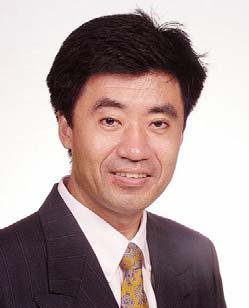The 13th IASTED International Conference on
Intelligent Systems and Control
ISC 2011
July 11 – 13, 2011
Cambridge, United Kingdom
KEYNOTE SPEAKER
Intelligent Control and Its Applications
Abstract
After a brief review of different types of robotic systems, industrial robots, autonomous robots, and social robots, that I have worked/am currently working on, the need for intelligent control is apparent, and advanced control is essential not only for high performance, but also for system beyond classical control design. In this talk, control system designs are presented for two extreme classes of systems that are beyond the classical control design.Many complex systems are usually difficult to model and governed by general (non-affine) nonlinear systems. The well developed control schemes for affine nonlinear systems find of little use. By elegantly utilizing the Mean value and implicit function theorems, the existence of ideal stabilizing control laws are first established for non-affine nonlinear systems. Then, by combining the adaptive control and neural network parametrizition techniques, stable adaptive neural network control is presented rigorously, which demonstrate that intelligent control can do what traditional adaptive control could not, and intelligent control provides the fundamentals for further development of advanced adaptive control for complex industrial systems. Because of the inherent differences of operators, adaptive controls are presented for nonlinear systems in both continuous time and discrete-time.
Finally, a new control design is presented for a class of nonlinear systems in strict feedback form with output constraint, though our newly introduced - Barrier Lyapunov Function - which grows to infinity when its arguments approaches certain limiting values. The key principle is that, by ensuring boundedness of the Barrier Lyapunov Function in the closed loop, we also ensure that the barriers are not transgressed. Asymptotic tracking is achieved without violation of constraint, and all closed loop signals remain bounded, under a mild condition on the initial output.
Biography of the Keynote Speaker

Shuzhi Sam GeProfessor, FIEEE, FIFAC, FIET, PhD, DIC, BSc, PengDirector, Social Robotics Lab, Interactive Digital Media Institute (IDMI) & Professor, Department of Electrical & Computer Engineering National University of SingaporeSingapore 117576
Director, Institute of Intelligent Systems and Information Technology (ISIT), and The Robotics InstituteUniversity of Electronic Science and Technology of ChinaChengdu, 611731, China
Shuzhi Sam Ge is the Director of Social Robotics Lab, Interactive Digital Media Institute, and Supervisor of Edutainment Robotics Lab, Department of Electrical and Computer Engineering, The National University of Singapore, and the Director of Institute of Intelligent Systems and Information Technology (ISIT), and Robotics Institute, University of Electronic Science and Technology of China.
He received his PhD degree and DIC from the Imperial College, London, and BSc degree from Beijing University of Aeronautics & Astronautics. He has (co)-authored three books, and over 300 international journal and conference papers. He serves/served as Vice President of Membership Activities, 2011, and Vice President of Technical Activities, 2009-2010, and Member of Board of Governors, 2007-2009, and Chair of Technical Committee on Intelligent Control, 2005-2008, of IEEE Control Systems Society. He served as General Chair and Program Chair for a number of IEEE international conferences.
He is the Editor-in-Chief, International Journal of Social Robotics, Springer. He has served/been serving as an Associate Editor for a number of flagship journals including IEEE Transactions on
Automatic Control, IEEE Transactions on Control Systems Technology, IEEE Transactions on Neural Networks, and Automatica, and Book Editor for Taylor & Francis Automation and Control Engineering Series.
He was the recipient of the inaugural Thousand Talent Scheme (TTS) Professorship, China, 2009; Changjiang Guest Professor, Ministry of Education, China, 2007; Outstanding Overseas Young Research Award, National Science Foundation, China, 2004; Inaugural Temasek Young Investigator Award, Defence Science and Technology Agency (DSTA), Singapore, 2002; National Technology Award of the National Science & Technology Board, Singapore,1999. He is Fellow of IEEE (Institute of Electrical and Electronic Engineers), 2006; Fellow of IET (The Institution of Engineering and Technology), 2009; Fellow of IFAC (International Federation of Automatic Control), 2010; He provides technical consultancy to industrial and government agencies. His current research interests include social robotics, multimedia fusion, adaptive control, intelligent systems and artificial intelligence.

















